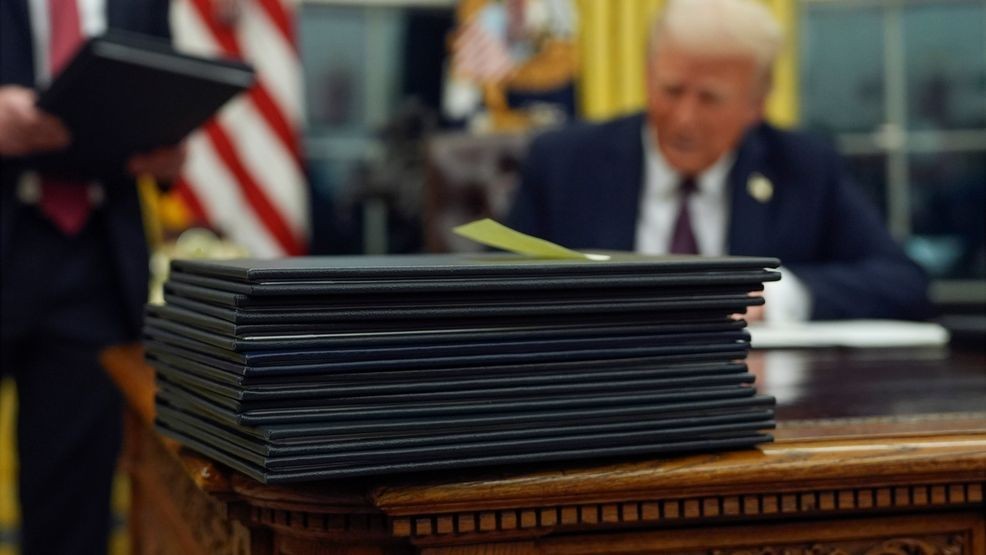WASHINGTON (TNND) — Chinese products will soon face a 10% tariff coming into the United States in a move that could ramp up conflict between the world’s two largest economies in what has become a bitter rivalry since the coronavirus pandemic swept across the world.
President Donald Trump said the administration is considering a 10% tariff on Chinese goods that could take effect on Feb.1 over fentanyl that has flowed into the United States and a lack of progress from China stopping it. The tariffs would come on top of billions of dollars in levies enacted during his first administration and expanded upon under President Joe Biden.
“We’re talking about a tariff of 10% on China based on the fact that they’re sending fentanyl to Mexico and Canada,” Trump told reporters in the Oval Office.
The threats to add tariffs has prompted concerns about a global trade war breaking out and adding onto the costs of goods for consumers, risking inflation spiking again and hurting future economic growth. But Trump so far has backed off of campaign promises to quickly institute sweeping tariffs and instead directed his administration to study trade issues and how potential tariffs could be implemented and collected on in the future.
Trump has previously threatened to place tariffs as high as 60% on all Chinese goods but has held off in the opening days of his presidency.
“We knew these were coming, and the proposed tariffs of 10 percent are softer than expected. This news likely brings some relief to Beijing—for the moment,” said Dimitar Gueorguiev is an associate professor of political science at Syracuse University’s Maxwell School of Citizenship and Public Affairs. “Looking ahead, Trump has repeatedly signaled that he can get along with Xi Jinping. From the Chinese perspective, this nudges the overall relationship in the right direction, as it represents a positive attitude regardless of the issues.”
Relations with China appear to be in a resetting period, as Trump has talked with Chinese President Xi Jinping and Vice President JD Vance has met with China’s vice president, who also attended Monday’s inauguration ceremonies. In Trump’s call with Jinping, they discussed trade, fentanyl and other areas where the U.S. and China can work together.
Along with sending its vice president to Washington, China has expressed willingness to work with the administration.
“Despite all the differences and frictions, the two countries enjoy tremendous common interests and space for cooperation,” a Chinese Foreign Ministry spokesman said Tuesday.
Along with the tariffs, another major talking point between the two nations will be the now-delayed ban of TikTok due to its parent company’s ties to China and concerns that it presents a national security risk.
Trump signed an order this week giving TikTok another 75 days to figure out how to remain open in the U.S. amid a ban went into place on Sunday after surviving a Supreme Court challenge. After initially trying to ban the popular video-sharing app during his first term, Trump has been working to save TikTok from going dark in the U.S.
The app shut itself down on Saturday evening for about 13 hours before coming back online on Sunday. It is still not being hosted by the major app stores for downloads and updates that are facing threats from China skeptics in Congress to enforce expansive fines for violating the law.
“We commend Amazon, Apple, Google, and Microsoft for following the law and halting operations with ByteDance and TikTok, and we encourage other companies to do the same,” Sens. Tom Cotton, R-Ark., and Pete Ricketts, R-Neb., said in a statement Sunday. “The law, after all, risks ruinous bankruptcy for any company who violates it.”
ByteDance has been adamant that it would not sell TikTok and would need sign-off from the Chinese government even if a deal with an American investor was worked out. China has signaled openness to a deal on TikTok this week as relations restart under the second Trump administration. Trump has also floated tying tariffs to China’s cooperation on a sale of TikTok to an American buyer.
“In practical terms, selling TikTok to an American buyer is not an obvious loss or even a concession for Beijing, so it’s not a bargaining chip. That said, a sale would be framed—and likely perceived—as a big deal and a win for Trump. Assuming the sale goes through, I see it providing further wiggle room on trade relations, but it’s not a deal maker or breaker,” Gueorguiev said.


